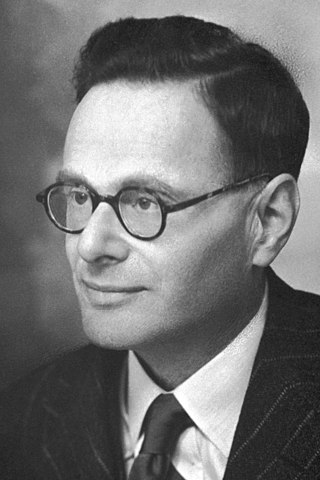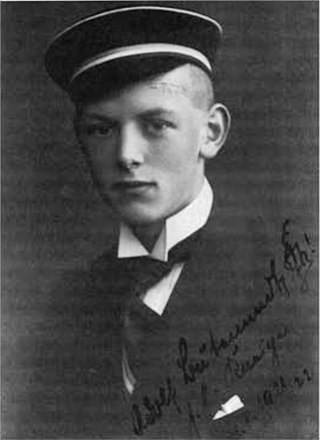Related Research Articles

Sir Hans Adolf Krebs, FRS was a German-British biologist, physician and biochemist. He was a pioneer scientist in the study of cellular respiration, a biochemical process in living cells that extracts energy from food and oxygen and makes it available to drive the processes of life. He is best known for his discoveries of two important sequences of chemical reactions that take place in the cells of nearly all organisms, including humans, other than anaerobic microorganisms, namely the citric acid cycle and the urea cycle. The former, often eponymously known as the "Krebs cycle", is the sequence of metabolic reactions that allows cells of oxygen-respiring organisms to obtain far more ATP from the food they consume than anaerobic processes such as glycolysis can supply; and its discovery earned Krebs a Nobel Prize in Physiology or Medicine in 1953. With Hans Kornberg, he also discovered the glyoxylate cycle, a slight variation of the citric acid cycle found in plants, bacteria, protists, and fungi.

The University of Göttingen, officially the Georg August University of Göttingen, is a distinguished public research university in the city of Göttingen, Germany. Founded in 1734 by George II, King of Great Britain and Elector of Hanover, it began instruction in 1737 and is recognized as the oldest university in Lower Saxony.

Otto Heinrich Warburg, son of physicist Emil Warburg, was a German physiologist, medical doctor, and Nobel laureate. He served as an officer in the elite Uhlan during the First World War, and was awarded the Iron Cross for bravery. He was the sole recipient of the Nobel Prize in Physiology or Medicine in 1931. In total, he was nominated for the award 47 times over the course of his career.

The Ludwig Maximilian University of Munich is a public research university in Munich, Germany. Originally established as the University of Ingolstadt in 1472 by Duke Ludwig IX of Bavaria-Landshut, it is Germany's sixth-oldest university in continuous operation.

The Technical University of Munich is a public research university in Munich, Germany. It specializes in engineering, technology, medicine, and applied and natural sciences.

The Max Planck Society for the Advancement of Science is a formally independent non-governmental and non-profit association of German research institutes. Founded in 1911 as the Kaiser Wilhelm Society, it was renamed to the Max Planck Society in 1948 in honor of its former president, theoretical physicist Max Planck. The society is funded by the federal and state governments of Germany.

The University of Rostock is a public university located in Rostock, Mecklenburg-Vorpommern, Germany. Founded in 1419, it is the third-oldest university in Germany. It is the oldest university in continental northern Europe and the Baltic Sea area, and 8th oldest in Central Europe. It was the 5th university established in the Holy Roman Empire.

Adolf Friedrich Johann Butenandt was a German biochemist. He was awarded the Nobel Prize in Chemistry in 1939 for his "work on sex hormones." He initially rejected the award in accordance with government policy, but accepted it in 1949 after World War II. He was President of the Max Planck Society from 1960 to 1972. He was also the first, in 1959, to discover the structure of the sex pheromone of silkworms, which he named bombykol.

Hans Fischer was a German organic chemist and the recipient of the 1930 Nobel Prize for Chemistry "for his researches into the constitution of haemin and chlorophyll and especially for his synthesis of haemin."

The University of Hamburg is a public research university in Hamburg, Germany. It was founded on 28 March 1919 by combining the previous General Lecture System, the Hamburg Colonial Institute, and the Academic College. The main campus is located in the central district of Rotherbaum, with affiliated institutes and research centres distributed around the city-state. Seven Nobel Prize winners and one Wolf Prize winner are affiliated with UHH.

The Max-Planck-Institute of Quantum Optics is a part of the Max Planck Society which operates 87 research facilities in Germany.

The Otto Hahn Prize is awarded biennially jointly by the Society of German Chemists, the German Physical Society and the city of Frankfurt am Main for outstanding achievement in the field of chemistry, physics or applied engineering science. It was established in 2005 by the merger of the previous Otto Hahn Prize for Chemistry and Physics and the Otto Hahn Prize of the City of Frankfurt am Main. The award is presented in the St. Paul's Church, Frankfurt am Main.
Kurt Heinrich Meyer or Kurt Otto Hans Meyer was a German chemist.
References
- ↑ "Ferenc Krausz – Facts". NobelPrize.org. 2023. Retrieved 2023-12-13.
- ↑ "Ferenc Krausz". Wolf Foundation. 2022-02-08. Retrieved 2023-12-13.
- ↑ The Nobel Prize in Physics 2005 - Theodor W. Hänsch
- ↑ Theodor W. Hänsch C.V. Archived 2009-01-01 at the Wayback Machine
- ↑ Wolfgang Ketterle C.V. Archived 2015-04-26 at the Wayback Machine
- ↑ IEEE: Biography of Gerd Binnig
- ↑ NobelPrize.org: Max von Laue - Biography
- ↑ Wilhelm Wien - 1911 Nobel Laureate in Physics Archived 2009-03-29 at the Wayback Machine
- ↑ Günter Blobel
- ↑ Bert Sakmann
- ↑ NobelPrize.org: Karl von Frisch - Autobiography
- ↑ Krebs, Hans Adolf (1900-1981): World of Microbiology and Immunology
- ↑ NobelPrize.org: Otto Loewi - Biography
- ↑ NobelPrize.org: Hans Spemann - Biography
- ↑ Liukkonen, Petri. "Thomas Mann". Books and Writers (kirjasto.sci.fi). Finland: Kuusankoski Public Library. Archived from the original on 22 December 2008.
- ↑ https://www.thedailybeast.com/the-catholic-philosopher-who-took-on-hitler
- ↑ Bayfield, Tony. "Hackenbroch, Hackenbroch, Yvonne Alix (1912–2012), museum curator and historian of jewellery (1912–2012), museum curator and historian of jewellery". ONDB. OUP. Retrieved 26 November 2017.